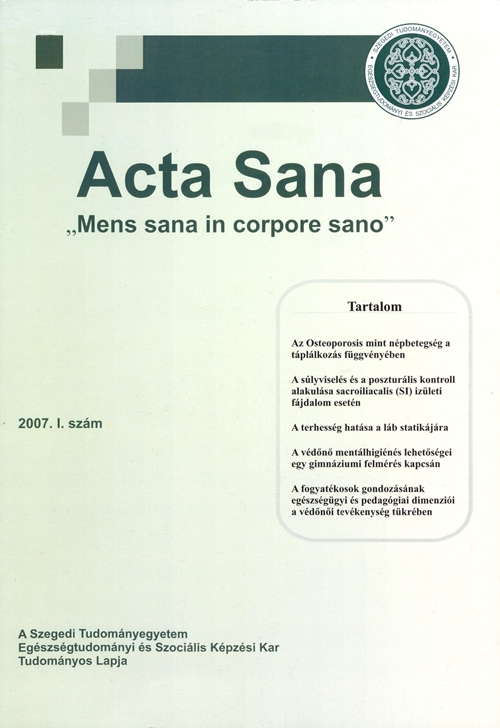A súlyviselés és a poszturális kontroll alakulása sacroiliacalis (SI) izületi fájdalom esetén
Main Article Content
Abstract
Objective: The objective of this work was to determine if weight-bearing and postural control were
associated with pelvis asymmetry and pain caused by sacroiliac joint (SIJ) dysfunction.
Methods: 32 students volunteered to participate in this study (mean age: 21 years). After standardized
physical examination we measured the weight-bearing with Neurocom Basic Balance Master with the
knee in 0°, 30°, 60° and 90° of flexion and the sway parameters (displacement of centre of mass) in
medio-lateral (ML) and antero-posterior (AP) directions during one-leg standing with eyes open and
closed. All of the data were subjected to analysis of variance.
Results: Six individuals had reported severe SIJ pain (SIJ-pain group), 4 of the remaining 26 students
had symmetric pelvis (control group) and 21 students had pelvis asymmetry without SIJ pain
(SIJ-pain-free group). There were no significant differences in weight-bearing at total knee extension
between in three groups. The weight-bearing was significantly higher on the contralateral leg to the
side of SIJ-dysfunction in group SIJ-pain with knee in 30° and 60° of flexion. The weight-bearing
became nearly equal on either side with the increasing of knee flexion (90°) in all groups. The body
sway was significantly higher in direction AP than ML in control group and SIJ-pain-free group but in
SIJ the body sway became significantly higher in direction ML compared with AP with eyes closed on
ipsilateral side.
Discussion: We concluded that the SIJ-pain significantly influences the weight-bearing in special
degrees of flexion (30° and 60°) wich is an important degree of flexion in knee joint during its funtion
(walk). The displacement of centre of body mass is significantly higher in direction AP than ML with
both opened and closed eyes but this finding became reverse in group SIJ with eyes closed on
ipsilateral side signifying the significant destruction of the control of hip joint.
associated with pelvis asymmetry and pain caused by sacroiliac joint (SIJ) dysfunction.
Methods: 32 students volunteered to participate in this study (mean age: 21 years). After standardized
physical examination we measured the weight-bearing with Neurocom Basic Balance Master with the
knee in 0°, 30°, 60° and 90° of flexion and the sway parameters (displacement of centre of mass) in
medio-lateral (ML) and antero-posterior (AP) directions during one-leg standing with eyes open and
closed. All of the data were subjected to analysis of variance.
Results: Six individuals had reported severe SIJ pain (SIJ-pain group), 4 of the remaining 26 students
had symmetric pelvis (control group) and 21 students had pelvis asymmetry without SIJ pain
(SIJ-pain-free group). There were no significant differences in weight-bearing at total knee extension
between in three groups. The weight-bearing was significantly higher on the contralateral leg to the
side of SIJ-dysfunction in group SIJ-pain with knee in 30° and 60° of flexion. The weight-bearing
became nearly equal on either side with the increasing of knee flexion (90°) in all groups. The body
sway was significantly higher in direction AP than ML in control group and SIJ-pain-free group but in
SIJ the body sway became significantly higher in direction ML compared with AP with eyes closed on
ipsilateral side.
Discussion: We concluded that the SIJ-pain significantly influences the weight-bearing in special
degrees of flexion (30° and 60°) wich is an important degree of flexion in knee joint during its funtion
(walk). The displacement of centre of body mass is significantly higher in direction AP than ML with
both opened and closed eyes but this finding became reverse in group SIJ with eyes closed on
ipsilateral side signifying the significant destruction of the control of hip joint.
Article Details
How to Cite
Bornemissza, Éva. 2007. “A súlyviselés és a poszturális Kontroll alakulása Sacroiliacalis (SI) izületi fájdalom esetén”. Acta Sana 2 (1):14-18. https://iskolakultura.hu/index.php/actasana/article/view/18380.
Issue
Section
Articles

